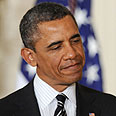
Said what he really thinks. Obama
צילום: MCT
Fragile alliance
Op-ed: Netanyahu jeopardizing intimate dialogue with US on issues of great strategic importance
US President Barack Obama told the State of Israel what he really thinks about Prime Minister Benjamin Netanyahu - not what he thinks about Israel, the US' military and diplomatic support of Israel, the "diplomatic process" or Iran. He clearly and simply said what he thinks about the Israeli prime minister and where he is leading the country.
These are harsh, frightening, unprecedented comments that had some connection to the remarks by former Shin Bet director Yuval Diskin. Israel is an ally. Netanyahu? Probably not.
It does not matter if the president of France, the German chancellor, the prime minister of Britain and the chairman of the Kryptonian Council think the same way. This is the president of the United States. The foolish discussion over the president's "intent" or the "timing" of the publication of his comments is also irrelevant. This is not about revenge. This is Obama's opinion of Netanyahu. We should listen to what the president of the United States has to say about the prime minister of an ally, Israel, and fully understand the content and ramifications.
The president, like the incoming secretaries of defense and state, believes Israel is leading itself toward international isolation and a diplomatic disaster. Netanyahu's response was irritating and sad, because it reflected a lack of understanding of the significance of Obama's remarks. "Netanyahu will not withdraw to the 1967 borders and will not allow Iran to obtain nuclear weapons." The Netanyahu government will also not allow the Romans to conquer Jerusalem again and will fight the British Mandate and the White Paper.
In the 65 years of its existence, Israel obtained one crucial strategic asset: The relations with the US. This alliance has constituted the pillar of Israel's deterrent power since the 1970s. As far as the US is concerned, this is not a natural or historic alliance. It developed slowly and gradually, with a lot of irrigating, fertilizing and attention. It is not obvious.
The partnership of values, the identical ideological basis, the shared strategic interests and the cultivation of the security and diplomatic relations are founded on basic trust and credibility. Netanyahu managed, with arrogance and impertinence, to rattle the very foundation of the relations by removing trust and credibility from the equation. Ever since the studious and preachy speech he delivered in front of the White House cameras, Netanyahu has effectively and irresponsibly declared a work dispute with the president of the United States and has not missed any opportunity to uselessly clash with Obama.
This does not mean that Netanyahu is not right about the issues at hand. It means that he is being defiant and is provoking Obama. It means that he is jeopardizing the quality and vitality of the intimate, honest and credible dialogue on issues of great strategic importance - such as Iran, Syria or Pakistan – at a time when American foreign policy is focused on the Far East and the US' dependence on oil from the Middle Easy is almost non-existent.
Netanyahu is endangering the quality of the alliance with the US by intervening in American politics, and mainly by losing the White House's trust. Israel, despite what it believes, is not a "strategic asset" of the US, just as it is not a "burden" – as it is often described by its critics. The US-Israel alliance is an asymmetrical one, and it has an element of dependency.
This is why the American president, who was elected by a coalition of voters who have no interest in Israel, feels comfortable expressing his opinion. Therefore, the smaller partner in this alliance should listen rather than criticize.
Alon Pinkas served as Israel's consul general in New York










